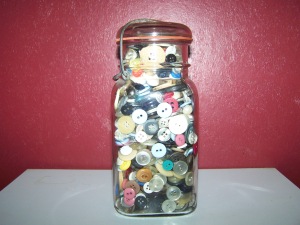Saving buttons is an antiquated notion (pun intended). Most people who saved buttons in previous generations did so because town was too far to go and buy new ones and finances didn’t allow for the frivolity of matching fasteners. So, skilled and thrifty women chose the closest matching button from their stash to repair their family’s clothes.
Now, it is much simpler in our consumerist society to discard a shirt missing a button and just go buy a new one. Too few of us see the value in replacing a missing button on a perfectly good shirt, especially one we’ve had for years and is our tried-and-true turn-to.
Or one discovered at The Goodwill.
That’s where I found this beautiful, vibrant fuchsia blouse that was perfect for livening up my work wardrobe. I tried it on in the store to make sure it fit properly and realized that it was missing a button in the center of the row. Most shirts have an extra button sewn into the inside seam just in case one is lost. This shirt didn’t, but that didn’t stop me from buying it. I knew that I’d be able to find a close enough match in my button jar to replace the missing toggle.
You know how this story ends…I moved the bottom button to replace the missing center button and sewed my close-enough match at the bottom of the row to be less conspicuous.
But this blog isn’t just about home crafts. It’s also about writing.
I had a minor illuminating thought as I worked to replace my button. Story ideas are like buttons. (Stay with me on this one.) We writers need to practice saving those seemingly insignificant gems we notice throughout the day that may lead to a very interesting story. It is popular today to follow the trends in fiction writing – to tell stories of vampires, zombies, and immortal gods – but there’s value in the simple stories that have been collected from everyday life.
A trivial event life like watching a grandparent recite a prayer while lighting a candle could lead to a story about generational witchcraft. Or listening to a child participate in her first concert could become a novel about the ups and downs of super stardom as a Nashville country singer.
The idea is to write down these presumed inconsequential incidents, save them, then return to them when they are needed because you’ve lost your inspiration. The idea may not match what you’re used to writing, but that’s okay. You can spin it to try something totally outside your comfort zone. Or you can camouflage it to correspond with your brand. The point is to make a habit of collecting the ideas.
You never know where your next great story will come from. It might even be from something noticed at The Goodwill.

